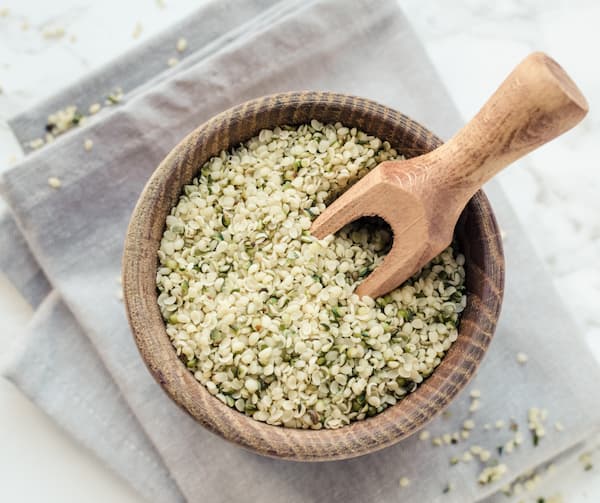It’s the battle of the seeds: hemp seeds vs. chia seeds. Incorporating these tiny but mighty superfoods into your diet can be an easy, convenient strategy to increase your fiber, protein and nutrient intake. Let’s compare the nutritional content of these nutritional powerhouses so you can understand which one to use and WHY.

In the table below, you will see a side by side comparison of the nutritional content of both hemp seeds an chia seeds. Hemp seeds are an excellent plant-based protein source with 10 grams of protein per serving! Chia seeds, on the other hand, have a much higher fiber content.
Both protein and fiber are very important in a well-balanced diet, so learning how to use these seeds to increase both nutrients can make a large impact on your health.

The Benefits of Hemp Seeds
Hemp seeds are derived from the Cannabis sativa plant. However, they only contain trace amounts of THC (tetrahydrocannabinol), the psychoactive compound found in marijuana – making them safe and legal to consume.
Hemps seeds are most notable for their protein, healthy fat and nutrient content. They’re slightly crunchy, with a mild nutty flavor – sold with or without the shell.
Complete Protein Source
Hemp seeds are a complete protein source, containing all nine essential amino acids that the body cannot produce on its own. Many compare the protein composition to that of soy protein or casein. This makes hemp seeds an excellent choice for vegans and vegetarians.
Manitoba Harvest Hemp Hearts, which are shelled hemp seeds, contain 10 grams of protein per 3 tablespoon serving. That’s more than a serving of almonds or even an egg!
See photo below for the full nutritional facts of this product.

Good Source of Healthy Fats
As you can see from the label, one serving of shelled hemp seeds contains 15 grams of fat. Most of the fat in these seeds are considered essential fatty acids, namely linoleic acid and α-linolenic acid, which cannot be synthesized by the body. These “healthy fats” have been shown to have protective effects against cardiovascular disease, obesity, diabetes mellitus, and anti-inflammatory disorders.
Further, the omega-6/omega-3 fatty acid ratio in hemp seeds could be associated with the reduction of chronic disease risk and mortality.
Nutritional Powerhouse
These little seeds are a nutritional powerhouse! Most notably, they’re a good source of magnesium, manganese, thiamin, phosphorus, and iron.
Hemp seeds contain 45% daily value of magnesium in just ONE serving. Magnesium has been shown to protect against cardiovascular disease, type II diabetes, osteoporosis, and may even prevent migraines.

The Benefits of Chia Seeds
Chia seeds come from a desert plant called Salvia hispanica. They stand out particularly due to their high fiber content and anti-oxidant potential, while also being a great source of omega-3 fatty acids.
Protein
Chia seeds have a lower amount of protein per serving when compared to hemp seeds. They are considered a complete protein, with about 5 grams of protein per 2.5 Tbsp. serving (depending on the brand).

Fiber
Chia seeds contain both soluble and insoluble fiber – shown to promote bowel regularity, reduce cholesterol, help regulate blood sugar levels, and promote a feeling of fullness.
Despite all the health benefits, most people are not meeting their recommended fiber intake throughout the day. This is where chia seeds really reign supreme! Just a sprinkle of chia seeds can provide almost half of the minimum recommended daily fiber intake with 10 grams of fiber per serving.
Chia seeds are a fantastic choice for those focused on gut health and weight management.
Healthy Fats
Like hemp seeds, chia seeds contain alpha-linolenic acid (ALA), a form of omega-3 fatty acids. Omega-3 fats play a crucial role in heart health and overall well-being.
The recommended daily intake of omega-3s can be hard to meet, especially if you don’t eat fish regularly. Chia seeds can be a convenient way to get all the health benefits of these fatty acids.
Nutrient Profile
Chia seeds contain calcium and iron, but not enough to be considered a “good” source of these nutrients (only 15% of the daily value).
However, several studies have examined the potential anti-oxidant properties of chia seeds. They contain quercetin, which is an anti-oxidant that has been shown to reduce inflammation and protect cells from oxidative stress.

How to Use Hemp Seeds and Chia Seeds
Hemp Seeds
Here are some popular and creative ways to use hemp seeds:
– Eat raw, right out of the bag as a snack.
– Add them to oatmeal, smoothies, yogurt, or on top of salads.
– Incorporate them into homemade muffins, cakes, granola bars, or cookies.
– Make your own hempseed milk or oil.
Chia Seeds
Here are some of the ways to incorporate chia seeds into your diet:
– Add them to water or juice for a nutritional drink.
– Make chia pudding (Dietitian Debbie).
– Incorporate them into smoothies, jams, salad dressing, dips, yogurt.
– Bake in pancakes, muffins, breads, cakes, granola bars.
– Use as a binding agent in replace of eggs in burgers or meatballs.
How Do Flaxseeds Compare?
Flaxseeds are another popular seed high in omega-3 fatty acids. Flaxseeds are quite comparable to hemp and chia seeds, however, lower in protein content (but slightly higher fiber content when compared to hemp seeds).
Hemp Seeds vs. Chia Seeds Showdown
Both hemp seeds and chia seeds offer incredible health benefits, but their strengths lie in different areas.
Hemp seeds excel in providing a complete protein source, omega-3 fatty acids, and a diverse range of vitamins and minerals. Meanwhile, chia seeds shine as a fiber-rich superfood with omega-3s and anti-oxidants.
Hemp seeds win for protein content, and chia seeds pack on more fiber. Both protein and fiber can assist with weight management by keeping promoting satiety, and keeping us fuller for a longer period of time.
Ultimately, the choice between the two will depend on your specific nutritional needs and preferences. Incorporating a mix of both into your diet can offer a well-rounded source of essential nutrients – or try a combined product like this Super Seeds Blend.
This post does contain Amazon affiliate links. At no additional cost to you, I receive a small compensation when a purchase is made.
